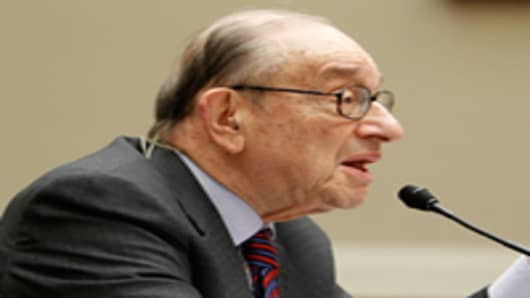The decision by Standard & Poor's to cut America's debt rating is, in Alan Greenspan’s view, bad for America’s state of mind.
“What I think the S&P thing did was to hit a nervethat there's something basically bad going on, and it's hit the self-esteem of the United States, the psyche,” said the former chairman of the Federal Reserve, in an interview with NBC’s Meet the Press on Sunday.
Having attacked S&P’s “terrible judgment” in an exclusive interview with CNBC, US Treasury Secretary Tim Geithner said America is much stronger than Washington itself and voiced his confidence in the “basic regenerative capacity of the American economy and the American people.”
Still, the effect of the downgrade on America’s psyche is expected to be very real, with the Chinese indicating repeatedly Washington has itself to blame for the downgrade.
“The first thing that will certainly be hit hard by the US debt downgrade is the US’s national pride. With the US now losing its AAA rating, the country will have to work extremely hard to regain it, which will take its own time,” said Devina Mehra, the chief strategist at First Global in a research note.
“When any negative unthinkable event takes place, equities are the worst hit. This time it won’t be any different,” said Mehra, just before stocks in Asia fell heavily at the openlast night.
Others, like Bernd Weidensteiner, an economist at Commerzbank, agreed that equities could be in for a rough ride but said he believes the effect on the Treasury market will be temporary.
“Money market disruptions are not to be expected since money market funds will not be affected by the rating action. They have only short-term Treasury paper in their portfolios, and the short-term rating was not affected. Finally, haircuts in the repo market will certainly not rise massively,” said Weidensteiner.
AA the New AAA?
As we prepare for what could be a volatile session one economist believes we are now well and truly in phase two of the economic crisis that started four years ago.
“The fist phase was dominated by recession and doubts about the private sector’s capacity, especially in the financial system, to service their debts,” said Dr. Harm Bandholz, the chief US economist at Unicredit Research.
“Now we are squarely in phase two: The investors in the government bond markets start to question the governments' ability to service their debts. This obviously affected only the ‘weaker’ credits so far. However, the fiscal positions of even the strongest economies have deteriorated significantly,” Bandholz said in a research note in which he predicted other AAA-rated government debt could come under pressure.
“Standard and Poor’s still has a somewhat more favourable opinion of the likes of Germany or France. However, especially in the case of France, this by no means guarantees a top rating,” he wrote.
“Therefore, we think that AA is the new AAA for the fiscally most powerful nations. This must not necessarily be disastrous, of course. After all, investors do not have too (many) alternatives to the ultra-liquid US Treasury market,” said Bandholz.



